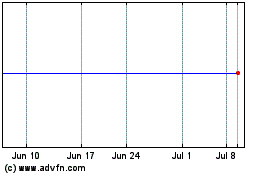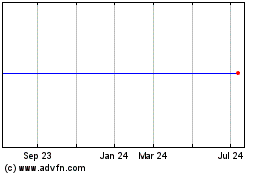Morley Safer, Eminent TV Journalist, Dies at 84
May 19 2016 - 3:20PM
Dow Jones News
Morley Safer, one of the best-known American television
journalists of the past five decades, died Thursday at his home in
Manhattan, his employer, CBS News, said.
CBS didn't provide a cause of death but said he had been in
declining health, which led to his retirement last week after more
than 50 years with the broadcaster. He was 84.
The Canadian-born journalist first drew wide notice in 1965 with
a CBS story that showed U.S. Marines torching thatched huts in the
Vietnamese hamlet of Cam Ne, an early example of the type of
reporting that helped stir opposition to the war in the U.S.
In 1967, when China was firmly closed to Western reporters, Mr.
Safer and a cameraman, John Peters, slipped into the country by
posing as tourists studying archaeology. They used a home movie
camera to show how ordinary people lived in China. The result was a
show called "Morley Safer's Red China Diary."
In a journalistic career lasting more than six decades, Mr.
Safer won dozens of awards. In a recent CBS program tracing his
career, however, Mr. Safer said he didn't particularly enjoy being
on TV. "It makes me uneasy," he said. "It is not natural to be
talking to a piece of machinery. But the money is very good."
Mr. Safer was born Nov. 8, 1931, in Toronto, where his father
ran an upholstery business. He later became a U.S. citizen, while
retaining his Canadian citizenship. In 1998, he told Maclean's
magazine he felt stateless. "I bring a different perspective, and I
have no vested interests," he said.
The writing of Ernest Hemingway inspired his ambition of
becoming a foreign correspondent, he once said. After attending the
University of Western Ontario for a few weeks, he dropped out and
found a job writing for the Sentinel-Review newspaper in Woodstock,
Ontario. He later worked for the Free Press in London, Ontario,
before moving to England, where he eventually was hired by Reuters
in 1955. He returned to Toronto and worked at the Canadian
Broadcasting Corp., for which he helped cover the Suez Crisis in
1956.
The Canadian broadcaster transferred him to London in 1961. A
fluke led him to defect to CBS in 1964: One of Mr. Safer's CBC
colleagues, applying for a job at CBS, provided a tape of a
round-table discussion including himself and Mr. Safer. CBS editors
preferred Mr. Safer and offered him a job in their London
bureau.
He eventually joined the "60 Minutes" news team and helped it
become a long-running hit. One of his highest-profile segments
there was a 1975 interview with Betty Ford in which the first lady
said she would consider it normal if her 18-year-old daughter
wasn't a virgin. A 1983 segment entitled "Lenell Geter's in Jail"
led to the overturning of the conviction of a black man who was
serving a life sentence for armed robbery in Texas.
Mr. Safer also was known for lighter stories, such as one about
a Pacific island nation whose economy relied on guano exports.
His hobbies included watercolor painting, poker and driving
luxurious cars, including a Ferrari convertible and a Bentley.
Mr. Safer is survived by his wife of 48 years, Jane, a daughter,
three grandchildren and a sister and brother.
Write to James R. Hagerty at bob.hagerty@wsj.com
(END) Dow Jones Newswires
May 19, 2016 15:05 ET (19:05 GMT)
Copyright (c) 2016 Dow Jones & Company, Inc.
CBS (NYSE:CBS)
Historical Stock Chart
From Mar 2024 to Apr 2024

CBS (NYSE:CBS)
Historical Stock Chart
From Apr 2023 to Apr 2024
